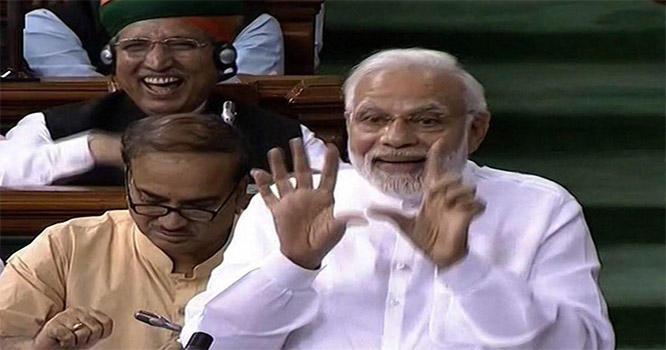Cox's Bazar, Oct 10: With her eyes welling up while narrating her family’s ordeal in Rakhine State in the neighbouring Myanmar, Jamila says the conditions will not be conducive and peaceful for the return of Rohinga refugees to Myanmar.
Speaking before a group of visiting journalists from a number of countries at this refugee camp, Jamila recounted that her husband Abdul Aziz and her teenaged son were killed two years ago in their village in Rakhine State by a marauding team of Myanmar Army.
'They killed my husband and slaughtered my son and destroyed our village Buchidan. I fled with other family members to safety and found shelter in Bangladesh,' Jamila, 35, said.
A similar experience was narrated by Zahid Hussain whose family also fled from Myanmar to avoid bloodshed and conflict. Both of them are among 1.2 million Rohingya refugees who have found shelter in this area of Ukhiya sub-district of Cox’s Bazar coastal district of Bangladesh.
The refugee camps, temporary shelters made of bamboo and tin shades, have sprung up on the entire hill in this sub-district which borders Myanmar. Thirty clusters of such camps are spread over 6,000 acres there.
'Nearly 80 per cent of the Rohingya refugees have been accommodated in camps here while rest of them are housed in Teknaf which is closer to the border with Myanmar,'’ said Mohd Nikaruzaman, Additional District Commissioner of Ukhiya sub-district.
Rohingya camps are located in hilly forest area , about 40 kms from the city of Cox’s Bazar, and the area, once inhabited by elephant herds and other wild animals, is teeming with blue and green tin roofs, bamboo and tarpaulin sheets and a mud road meandering through the camps.
Mr Nikaruzaman said that Bangladesh provided temporary shelter to fleeing Rohingya refugees on humanitarian grounds and the initial trickle swelled up to a large number last year. He said that total number of Rohingya refugees has gone up to 1.2 million which is four times the total local population of Ukhiya sub-district.
'Recalling difficulties in building settlements for them, he said that health and sanitation were big issues to be tackled. 'We carried out vaccination for cholera and installed deep bore handpumps in clusters for safe drinking water. Toilets and bathrooms were also provided and now we even have a learning centre for children. Food distribution centres have been set up to supply food grains to the families according to their size,’’ he told journalists.
Cox’s Bazar’s District Commissioner Kamal Hussain said that arrival of Rohingyas from Myanmar has now been reduced to a trickle and admitted that it was a very challenging task to provide food, shelter, health and sanitation facilities to them. 'Our Prime Minister Sheikh Hasina extended help on humanitarian grounds and its has been appreciated by the international community,' he said.
The senior official said that a number of global bodies, NGOs, local groups as well as several countries have extended assistance to Rohingyas in terms of medicines, food, clothing and shelter. UN bodies like UNHCR and World Food Programme have played a frontal role in such efforts.
The hilly area where such camps are located have been denuded as forests were cut to accommodate them. Solar lights have been installed at several locations and a 13-km long electricity line is all set to bring power to the camps. Many camps have also got LPG gas cylinders for cooking purposes and small shops have also come up in the area. The officials said that many Rohingyas also helped in the construction of a border road in the area.
Addressing the UN General Assembly’s 73rd session recently, Bangladesh Prime Minister Sheikh Hasina said that she felt the pain and suffering of Rohingyas and called upon international community to give due importance to the atrocities and injustice suffered by Rohingya population in Myanmar.
She said that Rohingyas hosted in Bangladesh were living in an uncertain situation and her country made arrangements for their food, clothing, healthcare, child-care and security. She said the Rohingya crisis originated in Myanmar and its solution has also to be found in Myanmar and added that Bangladesh wanted an early, peaceful solution to the crisis.








Comments
Add new comment